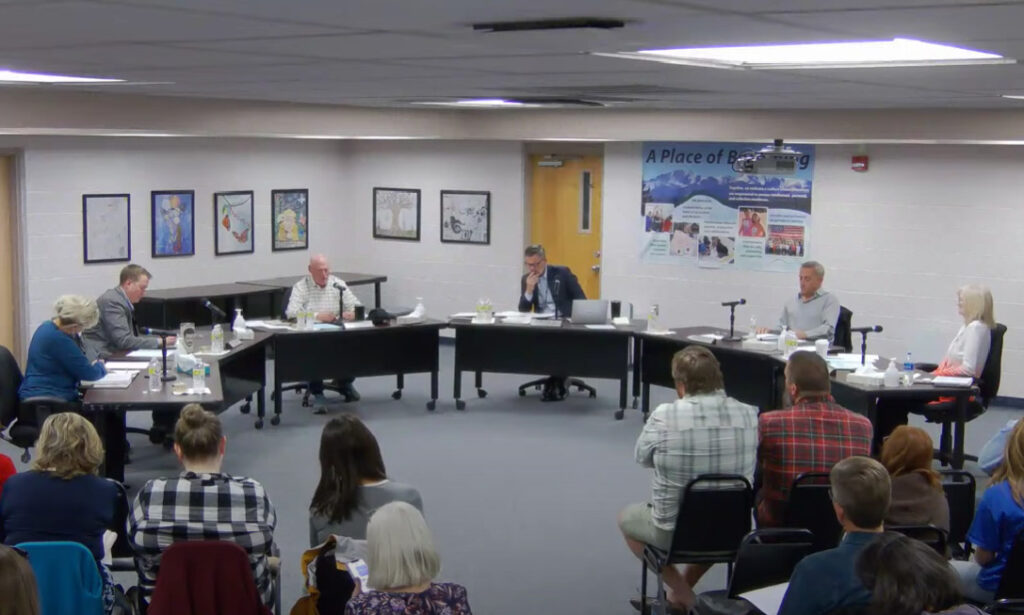By Jeffrey A. Roberts
CFOIC Executive Director
A judge Friday declined to hold members of the Woodland Park school board in contempt for allegedly violating his April order to list meeting agenda items “clearly, honestly and forthrightly.”
Teller County District Court Judge Scott Sells determined the board “was not completely forthright and transparent” with its May 4 agenda, which failed to say that a “feasibility study” pertained to a controversial charter school sharing space with a middle school.
But, applying a standard set forth by the Colorado Supreme Court in 2008, the judge wrote that “an ordinary member of the Woodland Park School District or person in Teller County would understand” that the charter school — Merit Academy — “was a likely candidate for discussion” under the agenda item.

The disputed agenda item for the board’s May 4 work session read: “Feasibility Study Presentation by Executive Director of Technology & Operations Miles Tuttle followed by BOE Q & A with Cooperative Strategies.”
That was five days after Sells granted a preliminary injunction, ordering the board to comply with the Colorado Open Meetings Law “by clearly, honestly and forthrightly” listing future agenda items pertaining to Merit Academy’s application to the district.
The board had been sued by parent Erin O’Connell, in part for discussing a substantive issue, a memorandum of understanding with the charter school, under a vague “BOARD HOUSEKEEPING” agenda item. O’Connell’s lawyer, Eric Maxfield, asked for the contempt citation against board members for repeating “their conscious hiding of a controversial issue from public observation” after the judge’s order.
During a Sept. 2 hearing on the contempt motion, O’Connell testified that “some people” in the Woodland Park community could assume from the May 4 agenda item that it concerned Merit Academy. “But would you know by reading it outright? I don’t believe so.”
David Rusterholtz, the school board’s president, insisted that “anyone who lived in Woodland Park, or was involved in any way with interest in the Woodland Park School District or Merit Academy, would have known without question that the feasibility study was in regard to the middle school and Merit Academy.” He said the issue “was all over Facebook” and the topic of an effort to recall school board members.
In determining whether a meeting notice was sufficient, the Colorado Supreme Court ruled in Town of Marble v. Darien that a judge must interpret the notice “in light of the knowledge of an ordinary member of the community to whom it is directed.”
Sells noted in his order that Merit Academy “has been a divisive issue in the community” and a discussion topic “at many Board meetings.” In finding that “an ordinary member” of the community would know the May 4 agenda pertained to Merit Academy, he also noted there had been a public discussion of the feasibility study of Merit using the middle school at an Apr. 27 meeting, and the issue had been tabled until May 4. Agendas for four subsequent meetings “all clearly mention Merit Academy.”
“Despite the lack of clearly stating the exact nature of the May 4, 2022, Agenda, the issue is whether they are guilty of remedial contempt?” the judge wrote.
Sells’ order briefly addresses a Colorado Open Records Act (CORA) request O’Connell made for the feasibility study, which was withheld initially by a school district employee. “The school district wrongly chose to keep the Feasibility Study from the public,” the judge wrote.
O’Connell’s main case against the school board is still pending. She alleges the board inadequately noticed meetings, in violation of the open meetings law, and then held a meeting to “rubber stamp” a previous inadequately noticed meeting.
Follow the Colorado Freedom of Information Coalition on Twitter @CoFOIC. Like CFOIC’s Facebook page. Do you appreciate the information and resources provided by CFOIC? Please consider making a tax-deductible donation.




